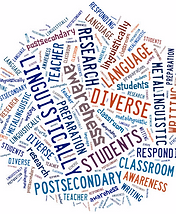DALIBORKA C. PADON, PhD
Specialized in Academic, Developmental, and Technical Writing
Research Statement
My research interests center on writing theories and pedagogies that develop students’ communicative practices across social, institutional, and professional contexts. In order to support the increasingly diverse students in post-secondary writing classrooms, I investigate innovative approaches to advancing students’ metalinguistic awareness across disciplines, genres, and discourse communities.
The ultimate goal of my research is to provide frameworks for writing pedagogies that will prepare students for their future professions, whether in the academia or in the corporate world. I address the gaps in the field regarding language structures as meaning-making resources—gaps that limit our approaches to multilingual and monolingual students alike. My research is grounded in critical language theories, translanguaging, activity theory, and communities of practice. With that in mind, my dissertation—Responding to Writing Fluency: An Activity Theory Analysis of Teacher Preparation and Practices—questions how the field of college composition shapes responding to student writing.
Chapter four of my dissertation is scheduled to be published by The Journal of Responding to Writing in fall 2019. In this chapter, I examine the discourses on responding to grammar in the best-selling college composition books and in the NCTE, CCCC, and CWPA position statements. Through Wenger’s concepts of Communities of Practice, I portray the situational factors that affect negative attitudes towards developing metalinguistic awareness in the college composition community.
Based on another chapter of my dissertation, I am currently preparing a manuscript that showcases the aforementioned attitudes through eight case studies of writing teachers’ responding activities. By utilizing Engeström’s version of Activity Theory, I uncover the systemic tensions between the field’s expectations of college writing outcomes and the institutional and personal standards that guide teachers’ responding activities. I argue that these tensions arise from process ideologies that have created a gap in teacher preparation and practices, ultimately shaping responding approaches that neglect to consider how rhetoric and meaning are reflected in the grammatical aspects of writing.
My dissertation serves as a springboard for additional projects, such as how teacher preparation programs consider the needs of college writing teachers, who take the role of non-traditional students in these programs. This project has been accepted by the 2016 Conference on College Composition and Communication, as well as by the 2017 Conference of European Association of Teaching Academic Writing in London, UK, thus showing future publishing potential.
In addition to the abundant publishing opportunities stemming off of my dissertation, my future research aims at investigating how multimodal texts mirror today’s linguistic diversity in the production of meaning; how that meaning is reflected in students’ communicative practices; and how those communicative practices could be enhanced across social, institutional, and professional contexts. The growing presence of diverse students in today’s U.S. colleges indicates that research on students’ critical language awareness would fill a space in college composition studies—a space that would prepare students to communicate effectively in their professions and in the multilingual and multimodal 21st century society.
